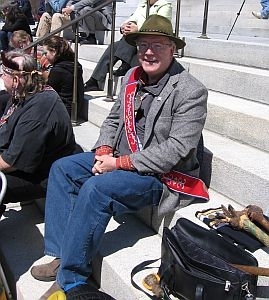 (Host) All this week VPR is examining race as part of our 2011 collaboration with the Vermont Humanities Council’s Vermont Reads statewide reading program.
(Host) All this week VPR is examining race as part of our 2011 collaboration with the Vermont Humanities Council’s Vermont Reads statewide reading program.
This year the focus is on Harper Lee’s To Kill a Mockingbird. The book examines racial prejudices in the racially-divided south.
Vermont also has some difficult race challenges of its own, in the first part of the 20th century eugenics promoted the idea of racial purity.
For the original Vermonters, the Abenaki, eugenics and racial prejudice led to a life lived in the shadows, where their ancestry was hidden, not celebrated.
As VPR’s John Dillon reports, the Legislature has taken steps to put that history behind us:
(singing and drumming)
(Dillon) Roger Longtoe, chief of the Elnu band of Abenaki, sang the high, clear notes of a greeting song in the governor’s ceremonial office.
The occasion was the signing of bills that grant official state status to two Abenaki bands. The room was crowded with lawmakers and Native Americans, who were there to mark the beginning of Abenaki recognition, and the end of a dark chapter in Vermont history.
(Illuzzi) "Our predecessors passed a law, which as a matter of public policy, deemed Native Americans as undesirable."
(Dillon) Essex Orleans Senator Vince Illuzzi has worked on Abenaki issues since the early 1990s.
That’s when the late Caledonia senator Julius Canns, who was part Cherokee, pushed for a resolution recognizing Vermont’s Native American communities.
Canns had cancer, and didn’t live long enough to see the bill pass. Illuzzi sees the legislation as both fulfilling a promise to his late colleague and undoing the legacy left by the eugenics movement. In the 1930s, the state-sanctioned list of "undesirables" who could be sterilized included Native Americans.
(Illuzzi) "We actually took testimony in the early 90s from individuals who were told by their grandparents: ‘Never admit you are Abenaki, never admit you are Indian, because if state officials find out about it, you may end up getting sterilized.’ "
(Dillon) Before Europeans settlement, the Western Abenaki once lived across Vermont, and northern New England. At least 1,700 Vermonters trace their ancestry back to those native people.
State recognition means two Abenaki tribes now qualify for federal education grants and can sell their crafts as native-made. Chief Don Stevens represents the Nulhegan band based in the Northeast Kingdom.
(Stevens) "We have here affected the next seven generations of our children. I mean they can be proud, hold their head up high. They can be eligible for scholarships in the future. We have now a working relationship, an official working relationship with the state of Vermont."
(Dillon) Fred Wiseman is an author, archaeologist and professor at Johnson State College. As Abenakis gathered in the spring sunshine on the Statehouse steps, Wiseman dug into some cloth bags to display artifacts that link their present to the past.
(Wiseman) "This is an original, late 17th early 18th century medal that came from the Abenaki territory."
(Dillon) Wiseman has put together a study guide for schools to use to teach Vermont children about Abenaki culture.
(Wiseman) "Vermont was certainly not a friendly place to be native, because, well, you know, the French and Indian War. So the Abenaki community were both Indian. Bad. French. Bad, and they were Catholic. Bad. So this heritage had to contract in."
(Dillon) Wiseman has served as a scholar for the Vermont Commission on Native American. He’s helped the panel review requests for recognition. The process has been controversial.
Some have charged that people with little or no native blood are being recognized as Abenaki. A recent meeting of the Vermont Commission on native American Affairs degenerated into a shouting match between rival bands.
But Wiseman says genealogical proof isn’t the whole story.
(Wiseman) "For example, my grandmother was of Abenaki descent, but because of eugenics and things we didn’t keep any of that in my family. So the genealogy is only a small part of it. It’s keeping the culture alive. It’s keeping the crafts, it’s keeping the beliefs; it’s keeping the technology. So it’s a whole system. To be a culture, yes, you do have to have ancestry. But for me as an archaeologist and anthropologist, of course, the most important thing is the culture itself."
(Dillon) Wiseman and other advocates say state recognition will not lead to land claims or casinos built on native land. What it does mean, they say is that the Abenaki can now take their legitimate place in the unfolding story of Vermont.
For VPR News, I’m John Dillon.